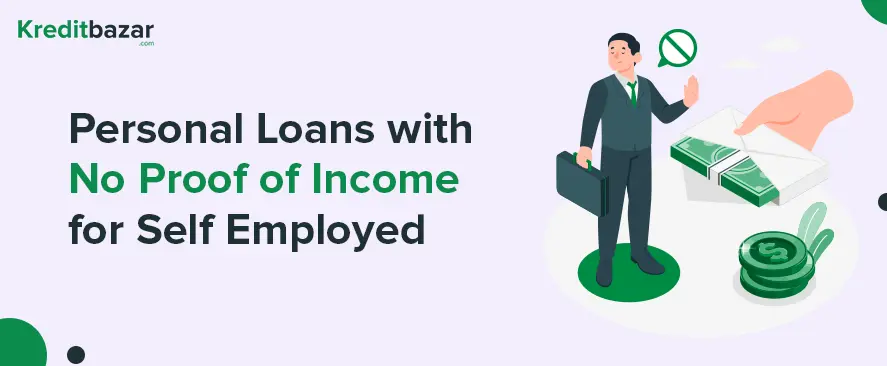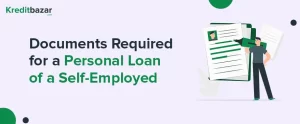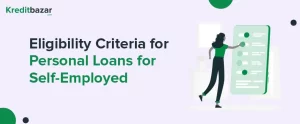![]()
Personal loans are one of the most popular financial products in India, offering a convenient way for individuals to manage various financial needs—be it funding a wedding, renovating a home, or addressing an unexpected medical expense. Personal loans are typically unsecured, meaning they don’t require collateral, and they are processed quickly, making them a preferred choice for many borrowers.
For salaried individuals, the process is straightforward, with fixed monthly income acting as a reliable source for loan repayments. However, for self-employed individuals, securing a personal loan can be more complex, especially when they lack formal income documentation. Lenders generally require proof of income, including documents such as salary slips, bank statements, or income tax returns (ITRs) to verify an applicant’s repayment capability. This is where self-employed individuals, especially those without proof of steady income, face significant challenges.
For instance, freelancers, small business owners, or independent contractors often have variable incomes. Even if they earn well overall, the fluctuation in monthly income makes it difficult for lenders to gauge their repayment reliability. Without concrete proof of income, self-employed borrowers may face rejections or less favourable loan terms.
This guide aims to help self-employed individuals in India navigate the complex landscape of obtaining a personal loan without formal income documentation. We will explore the reasons behind income-proof requirements, discuss the challenges faced in obtaining a loan without these documents, and outline possible solutions for securing financing as a self-employed borrower.
Table of Contents
Understanding the Need for Income Proof in Personal Loans
Why Lenders Require Income Proof
For any lender, the primary concern is assessing the borrower’s ability to repay the loan. This is why income proof is crucial—it helps lenders determine the borrower’s financial stability and consistent repayment capability. Income documentation, like salary slips or ITRs, provides a quantifiable measure of a borrower’s financial standing, allowing lenders to calculate loan eligibility accurately.
Income proof assures lenders that a borrower has sufficient earnings to meet monthly EMI (Equated Monthly Instalments) obligations, reducing the risk of loan default. In cases where borrowers lack formal income proof, lenders often need to rely on alternative indicators of financial stability or may request collateral to secure the loan.
Risks for Lenders Without Proof of Steady Income
Lenders face significant risks when offering personal loans to applicants without verifiable income proof. The absence of income documentation makes it challenging to predict whether a borrower will reliably meet EMI payments. This risk increases the likelihood of default, which impacts both the lender’s profitability and the broader financial ecosystem.
Without income verification, lenders have limited options to recover the loan amount if the borrower defaults. To manage this risk, lenders may either deny the loan application or impose stricter conditions, such as higher interest rates or shorter repayment tenures.
Alternatives When Income Proof is Unavailable
Fortunately, self-employed borrowers have some alternatives when they lack traditional income documentation. Some of these options include:
- Using bank statements to demonstrate consistent cash flow.
- Providing GST returns or other business-related documents that indicate income patterns.
- Opting for collateralized loans, where assets are used as security to mitigate the risk.
- Exploring non-banking financial companies (NBFCs) or digital lending platforms, which are often more flexible with eligibility requirements.
In the sections below, we’ll dive deeper into the challenges of securing a personal loan without income proof and explore ways to improve your chances of getting approved.
Challenges of Securing a Loan Without Income Proof
Limited Loan Options
Self-employed individuals without formal income documentation face limited options when it comes to personal loans. Traditional banks and financial institutions tend to be more conservative in their lending approach, prioritizing salaried individuals with steady incomes and documented financial history. In contrast, those without income proof may need to seek alternatives through NBFCs or fintech lenders who specialize in catering to self-employed applicants. However, even these alternatives may come with restrictions or higher qualification criteria due to the perceived risk.
Higher Interest Rates
Without documented income, lenders categorize self-employed borrowers as high-risk applicants. To offset this risk, lenders generally charge higher interest rates, which can make the loan significantly more expensive over time. While salaried individuals with a stable income may secure a loan at a lower interest rate, self-employed borrowers without income proof may have to pay much higher rates to compensate for the lack of verified repayment ability.
Higher interest rates can lead to a substantial increase in EMI amounts, impacting overall affordability. Borrowers must carefully evaluate these increased costs before proceeding with a loan, considering alternative funding sources if interest rates seem unmanageable.
Shorter Loan Tenures and Lower Loan Amounts
Another challenge faced by self-employed individuals with no income proof is restricted loan tenures and loan amounts. Due to the perceived risk, lenders may only offer shorter repayment periods to mitigate the potential for default. While salaried individuals might get tenure options of up to five years, self-employed borrowers without income proof might only qualify for two to three years.
Similarly, lenders may cap the loan amount available to self-employed borrowers without income documentation, as limiting exposure is a common risk management strategy. A reduced loan amount can sometimes prevent borrowers from fulfilling their financial requirements, forcing them to seek multiple loans or look for additional funding sources.
Alternative Documents for Personal Loan Eligibility Without Income Proof
1. Bank Statements
For self-employed individuals lacking formal income proof, bank statements can serve as a crucial alternative to verify financial stability. Recent bank statements, particularly those covering the past six to twelve months, can demonstrate consistent deposits, regular transactions, and adequate balance levels. Lenders may evaluate these statements to understand the applicant’s cash flow and financial reliability, making them a valuable substitute for conventional income proof.
2. GST Returns
GST returns provide evidence of a steady flow of business income, making them an effective tool for self-employed individuals to showcase financial health. GST filings reflect the business’s revenue generated over time and indicate the consistency of transactions. Lenders can use these returns to gauge business profitability and stability, helping self-employed borrowers qualify for loans without traditional income documentation.
3. Business Financial Records and Invoices
Business financial records, such as profit and loss statements and invoices, can support a loan application by demonstrating the financial viability of a self-employed individual’s business. These records show the regularity of transactions and income generated over time, giving lenders a clearer picture of the borrower’s ability to manage loan repayments. For small business owners and freelancers, maintaining organized and up-to-date financial records can greatly increase loan eligibility.
4. Income Tax Returns (ITR)
Even a single year’s worth of ITR filings can be beneficial for loan approval when no other income documentation is available. Income tax returns provide evidence of declared income, showcasing transparency and financial responsibility. Self-employed individuals who submit ITRs are viewed more favourably by lenders as these documents verify income levels and prove tax compliance. In cases where formal income proof is lacking, ITRs can play a vital role in establishing loan eligibility.
5. Collateral Documents (for Secured Loans)
When income proof is not available, opting for a secured loan using collateral can increase a self-employed borrower’s chances of approval. Collateralized loans require an asset—such as property, gold, or other valuable items—to secure the loan, which reduces the need for income verification. Collateral documents offer lenders assurance in case of default, making it a suitable alternative for those without documented income.
Types of Loans Available for Self-Employed Without Income Proof
1. Secured Personal Loans
Secured personal loans are an option for self-employed individuals without income documentation, as they require collateral rather than income proof to back the loan. Assets like property, fixed deposits, or other valuables can serve as collateral, providing the lender with a guarantee in case of default. This significantly reduces the need for income verification, as the collateral itself acts as a repayment assurance, making secured personal loans a practical choice for self-employed borrowers.
2. Gold Loans
Gold loans are a popular and accessible option for those needing funds without formal income proof. Since these loans are backed by the borrower’s gold assets, lenders focus less on income stability, relying instead on the value of the pledged gold as security. Gold loans are known for their quick disbursal, minimal documentation, and ease of approval, making them a convenient solution for self-employed individuals.
3. Loan Against Property (LAP)
A Loan Against Property (LAP) is an option where the borrower can pledge residential or commercial property as collateral. This type of loan is beneficial for self-employed individuals who may not have income documentation but own property. By securing the loan with property, lenders are willing to offer higher loan amounts and lower interest rates, making it an attractive choice for those needing larger funds without income proof.
4. Peer-to-Peer (P2P) Loans
Peer-to-peer (P2P) lending platforms are an alternative financing source with less stringent documentation requirements than traditional banks. P2P loans connect borrowers directly with individual lenders, who may be more lenient regarding income verification. For self-employed individuals, P2P platforms offer flexibility, quick disbursal, and personalized terms that cater to unique financial circumstances, especially where income proof is unavailable.
5. Loans from NBFCs (Non-Banking Financial Companies)
NBFCs have gained popularity for their flexible lending criteria, especially for self-employed individuals lacking formal income proof. Unlike traditional banks, NBFCs often provide customized loan products with relaxed eligibility requirements, making them accessible to a broader range of applicants. For self-employed borrowers, NBFCs offer an excellent alternative, with options for both secured and unsecured loans that prioritize business cash flow or asset ownership over strict income documentation.
Factors Lenders Consider When Income Proof is Unavailable
1. Credit Score
A high credit score can significantly increase loan approval chances for self-employed borrowers without income documentation. A strong credit score demonstrates responsible financial behaviour and repayment history, instilling confidence in lenders. When income proof is unavailable, a favourable credit score can act as a compensating factor, showcasing the borrower’s creditworthiness and improving eligibility for personal loans.
2. Business Stability and Experience
For self-employed individuals, the length of time they have been in business can indicate financial stability. Lenders consider a business’s tenure and track record as indicators of reliability. A well-established business with consistent operations is viewed more favourably, as it shows that the borrower has a stable source of income, even if formal income proof isn’t available.
3. Existing Assets or Collateral
Ownership of assets such as property, vehicles, or valuable items can bolster a loan application for self-employed borrowers. Assets serve as financial backing and show that the borrower has alternative means of repayment in case of a financial shortfall. If income documentation is lacking, demonstrating ownership of assets or offering collateral can substantially improve the chances of loan approval.
4. Personal Savings and Investments
Personal savings, fixed deposits, and other investments can indicate a borrower’s financial discipline and stability. For lenders, seeing that an applicant has maintained personal savings or investments suggests they are financially responsible, increasing the likelihood of loan approval even without income proof. Maintaining savings and investment records can thus be an essential factor for self-employed individuals seeking a personal loan.
5. Co-Applicant with Stable Income
Adding a co-applicant with a stable income can enhance loan eligibility for self-employed borrowers. A co-applicant, such as a family member with verified income, shares the responsibility of repayment, reducing the risk for lenders. This strategy is particularly useful when the primary applicant lacks income documentation, as it strengthens the overall application and may lead to more favourable loan terms.
Tips to Improve Loan Approval Chances Without Income Proof
1. Build a Strong Credit Score
For self-employed individuals, a high credit score can significantly boost loan approval chances, especially when income proof is unavailable. Steps to enhance creditworthiness include making timely bill payments, keeping credit card balances low, and avoiding frequent credit inquiries. A strong credit score reflects financial responsibility and assures lenders of your ability to manage debts. By diligently monitoring and improving your credit score, you increase the likelihood of being considered for a loan.
2. Opt for Collateral-Based Loans
Collateral-based loans provide security to lenders by offering a tangible asset in case of default. By pledging property, gold, or other valuable assets as collateral, self-employed borrowers can offset the need for income proof. Not only does collateral increase the chances of loan approval, but it can also result in more favourable terms, such as lower interest rates and longer repayment tenures. For individuals without documented income, choosing a secured loan is often a practical approach.
3. Show Regular Cash Flow in Bank Statements
Demonstrating regular cash flow in your bank account is essential for self-employed individuals without income documentation. By depositing earnings consistently, you can provide proof of business activity and financial stability. Lenders may view consistent deposits as a sign of steady income, even if it isn’t formally documented, increasing the chance of loan approval.
4. Limit Loan Amounts
Applying for a smaller loan amount can improve your chances of approval when income proof is unavailable. Lower loan amounts reduce the risk for lenders, making them more willing to approve your application. For self-employed individuals, starting with a smaller loan and building a repayment history can open doors to larger financing options in the future.
5. Consider NBFCs and Digital Lenders
NBFCs and fintech lenders often provide more flexible loan options for self-employed borrowers compared to traditional banks. These lenders typically have relaxed eligibility criteria, streamlined application processes, and are open to working with applicants who lack income proof. By exploring loans through NBFCs and digital lenders, self-employed individuals may find more suitable options tailored to their needs.
Personal Loan Interest Rates for Self-Employed Without Income Proof
Comparison of Interest Rates with Income Proof vs. No Income Proof
Interest rates on personal loans can vary significantly based on the availability of income proof. For individuals with documented income, lenders typically offer lower interest rates as there’s verifiable proof of repayment ability. Conversely, loans without income proof often carry higher interest rates due to increased risk for the lender. This difference emphasizes the importance of income documentation in securing more favourable loan terms.
Factors Affecting Interest Rates
Several factors influence personal loan interest rates, including credit score, collateral, loan tenure, and borrower stability. A high credit score can lead to lower rates, as it reflects responsible financial behaviour. Similarly, offering collateral can reduce interest rates by mitigating the lender’s risk. Loan tenure also plays a role, with shorter repayment periods generally leading to lower rates. By understanding these factors, borrowers can better prepare for and potentially reduce the interest rates offered.
Ways to Negotiate Lower Interest Rates
Borrowers can negotiate lower interest rates, especially when collateral is involved. Lenders may be open to discussions around interest rates if the borrower has a solid credit history, provides a significant down payment, or pledges valuable assets as security. Being transparent about your repayment plan and offering alternatives, like a co-applicant, can also improve the chances of negotiating a better interest rate.
Role of NBFCs and Fintech Lenders in Loans Without Income Proof
1. Flexible Eligibility Criteria
NBFCs and fintech lenders have become popular for self-employed borrowers due to their more flexible eligibility requirements. Unlike traditional banks, NBFCs often prioritize cash flow over formal income documentation, making it easier for self-employed individuals to qualify. These lenders assess the overall financial picture of the borrower, considering factors such as business activity, transaction history, and credit score.
2. Quick Processing and Less Documentation
NBFCs and fintech lenders are known for their streamlined loan processes, offering quick approvals with minimal documentation. These lenders typically leverage technology to speed up the loan approval process, often processing applications within a day or two. For self-employed individuals without income proof, the reduced documentation requirements and fast processing can be particularly advantageous, ensuring quicker access to funds.
3. Popular Fintech Lenders for Self-Employed Loans
Several fintech lenders cater specifically to self-employed borrowers, providing loan options with flexible terms and minimal documentation requirements. Popular fintech lenders in India include Kreditbazar, which offers pre-approved loan options, and others such as PaySense, Capital Float, and Lendingkart. These lenders are renowned for their user-friendly platforms, rapid disbursals, and tailored loan products designed to meet the needs of self-employed individuals.
How to Apply for a Personal Loan Without Income Proof
Step 1: Gather Alternative Documents
Start by collecting alternative documentation that can serve as income substitutes, such as recent bank statements, collateral documents, GST returns, or income tax filings. These can help demonstrate financial stability and improve eligibility.
Step 2: Research and Choose a Lender
Select a lender that has flexible documentation requirements for self-employed individuals. NBFCs and fintech lenders typically offer such flexibility, allowing you to apply with alternative proof.
Step 3: Apply Through the Preferred Method
Submit your application through the lender’s recommended method, either online or at a branch. Many lenders offer digital application processes, which can streamline approvals and reduce paperwork.
Step 4: Complete Verification and Negotiation Process
Lenders may require additional verification steps, such as reviewing bank statements or business documents. Be prepared to negotiate interest rates and terms to secure the best possible offer.
Step 5: Review Terms Before Signing
Thoroughly review the loan terms, including interest rates, repayment tenure, and EMI structure, to ensure they align with your financial goals. Confirm all details before signing the loan agreement.
Common Mistakes to Avoid When Applying for a Loan Without Income Proof
1. Choosing High-Interest Loans
One common mistake is agreeing to high-interest loans simply due to the lack of income proof. Accepting high rates can lead to significant financial strain over time, especially for longer tenures. Compare lenders to find reasonable rates and avoid this costly mistake.
2. Not Considering Alternative Loan Options
Many borrowers overlook other loan types, such as secured loans, that could offer better terms. By considering alternative financing options like collateral-based loans, borrowers may access lower interest rates and improved terms, making loan repayment easier.
3. Overlooking Documentation of Cash Flow
Another common error is neglecting to maintain records of business cash flow. Keeping accurate records of deposits, withdrawals, and other business transactions can strengthen your application by showing consistent income patterns, even if income proof is unavailable.
Conclusion
From alternative documents to flexible loan options, Kreditbazar makes it possible for self-employed individuals to access loans without traditional income proof. Each section highlights how Kreditbazar helps borrowers improve their chances and access financing with minimal stress.
With Kreditbazar’s dedicated support, self-employed borrowers can confidently explore their financing options, securing loans tailored to their needs.
Discover Kreditbazar’s loan options for self-employed individuals today. With competitive rates and flexible terms, Kreditbazar is here to help you meet your financial goals.





